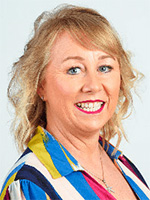Jacky Westbrook has had a unique career working from the ground up through the banking system and now her goal is to pass on her insights to those starting out in the industry.


Jacky Westbrook
Corporate Sales Director (UK & Ireland)

Tell me how you got to your current position.
My professional career started after my 16th birthday at RBS [Royal Bank of Scotland] in the machine room, where the cheques were processed. We would handle the cheques as they came in, and if there was a spelling mistake on your statement that would have been my fault! We would input the cheques, batch them all up and then post them to the Bank of England. We used to share a computer between four of us! That was 1987.
I worked through the RBS machine room and moved on to being a cashier, and then working on opening corporate bank accounts, corporate loans and corporate advances. I became the Chief Cashier of the RBS branch in Jersey, counting money and dealing with clients. From there, I moved into a role where I was assisting a new Head of Treasury with crunching numbers, updating spreadsheets and the like when they offered me a role to stay as FX trading assistant and later, I moved on to selling vanilla and structured deposits.
I then decided to move to London. I moved in 2007 to be the Business Development Manager for RBS Financial Markets’ short-term markets desk and I was tasked with increasing client deposits.
We went to hell and back in 2008 and 2009 during the global financial crisis. That’s when people realised that cash is the most important thing on the bank’s balance sheet – if you don’t have that you don’t have a bank. Cash moved from being the poor cousin to being front and centre. It was an exciting time, but at the time it was scary as hell.
After taking maternity leave, I came back to RBS and then six months later I was made redundant. The redundancy made me reflect on my banking career and pushed me to do what I wanted to do – it forced me to make the leap. I took a few months out, and I was not even going to look for another job as I didn’t know if I really wanted to go back into banking, I decided it was and then a role came up at State Street Global Advisors in cash sales, and in January 2019 I joined as the Corporate Salesperson. It has been a challenge – often cold calling but what has always helped me In the face of challenges – your team. It is really important to have a team that supports you, people you can vent with, people who let you get it out so you can process it and move on.
How have you seen the conversation that we are having around inclusion and diversity evolve?
In my time it has changed drastically because people talk about it now. For many years, say 20 years ago, it would have never been discussed. It was almost a silent thought that ‘it is the boys who always get the good jobs’ – it’s almost how you were brought up. To be able to talk about it is the biggest step – it is not taboo anymore. And to be able to call people out on it is also a big step. In the past, if you made any kind of comment, it would be frowned upon. In fact, it would be sheer shock and horror. More people are empowered to speak out because they see more people doing it. It feels like those who are not as confident feel like they can do it because they see the likes of me talking about it, and if necessary, calling it out, and having no repercussions for calling it out.
What advice would you give to women in finance in terms of establishing and developing a career?
Build a network through your life and career from the very beginning with people you want to be associated with and who inspire you. Find people who will give you that confidence you may need sometimes and keep them, have that network of people that will help you through your career. They should be able to help in different ways: some may be able to help in a holistic way, others may help specifically with guidance on your career. Have your sounding board, your confidantes, for when you are frustrated with something. They can help you reason; they will be the people who advise you to write that email but not to send it until the next day when you have had a chance to think about it – you need those sorts of people in your life.
Do you think it is important to have a defined career plan or is it more a case of being open and flexible?
I believe you have to have a mix. You have to have a goal – you may call that a defined career plan – but you have to be open and flexible on how you get there. But never lose sight of what your goal actually is.
My goals changed early on in my career. Now in this part of my career I am actually where I want to be – I am happy where I am and what I have achieved. My goal now is to pass that knowledge onto people who are coming into the industry who will never have the experience I have of working through the whole system. I want to help them have the confidence to take the steps they need to, and I want to make things better for those coming into the industry.
What is your motto in life, or your greatest inspiration?
My motto in life is to be a little bit scared every day because that means you are challenging yourself. In the workplace you need something that keeps the adrenaline going, but also you need to know at the same time that you can do it. It could be something as simple as picking up the phone and speaking to someone you have never spoken to.